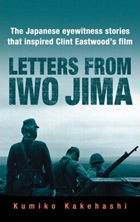BOOK REVIEW:
Like Clint Eastwood’s film of the same name, this book
looks at the war of Iwo Jima from the Japanese’s point
of view. Like the critically-acclaimed movie, this collection
of eyewitness stories will affect you emotionally.
Written
by first-time book writer Kumiko Kakehashi, the pages of this
collectible-worthy book chronicles her research, which centers
itself on Lieutenant General Kuribayashi Tadamichi, played
by Ken Watanabe in the film version. It follows his initial
landing on the doomed island, to the several letters he sent
out to his family, and eventually the last telegram from the
noble soldier.
Within
the pages are stories told to the author by his children (who
were dead by the time the book was published), as well as
touching vignettes of how the man would show his love for
the family through the personally affecting letters he sent
from Iwo Jima.
There
are also patriotic commands and verses written by Kuribayashi
which showed what a great leader he was. It seems like this
commander was well-respected, even by the Americans.
Present
in the book are also tidbits about the island, how it is rich
in sulfur (hence its Mandarin direct translation for ‘sulfur
island’), and how the black sands are a result of the
ashes from the dormant volcanoes.
There
are also references made to James Bradley’s “Flags
of Our Fathers”, which we thought are a nice touch to
bring both sides of the story together.
Two
outstanding chapters to read are “The Island Where You
Walk On The Dead” and “The Soldiers’ Letters”,
where the author writes about the somber feelings of dread
when she visited Iwo Jima in person, and how she went through
many miscellaneous letters from other soldiers that painted
pictures of homesickness and longing. We’d advise you
get your tissues ready for this.
Perhaps
the most affecting parts of the book are the pictures enclosed
in the middle section. There, you’d see Kuribayashi’s
real-life picture, with his German Shepard and walking cane.
A truly dignified photo indeed. There are also scanned letters
written by the man himself. We can’t help but feel a
lump in our throats, especially while seeing Kuribayashi’s
daughter’s letter to her father. There, the family man
corrects a grammatical error made by his daughter, which only
goes to show how noble family love is.
CHOICE XCERPT:
As I read Kuribayashi’s letters in chronological order,
I realized that they all started with an assurance of his
safety.
“Skipping all the opening formalities, I am hale and
hearty as ever, so there’s no need to worry about me”;
“I am robust and working away, so there’s no need
to worry about me,”; “I am really very well, so
there’s no need to worry about me,”; “I
am still safe and sound, so there’s no need to worry
about me,” Given the circumstances he was in, Kuribayashi
clearly felt that his still being alive was the most important
fact for him to get across to his family. "
VERDICT:
A
highly recommended read which will remind you that there are
no winners, only losers, in a war. As the present war-ignorant
generation enjoys peace, it is only apt that we reflect on
those important historical events gone wrong. Like the film,
this book is also a good companion to James Bradley’s
“Flags of Our
Fathers”.
    
Review
by John Li
|

